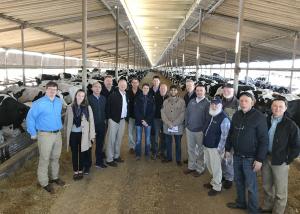Corn, barley and sorghum farmers from across the United States traveled to Morocco as part of the U.S. Grains Council’s (USGC’s) annual Grain Export Mission (GEM) to learn about how the Council’s programs have contributed to the development of the livestock industry in Morocco.
“The GEM is designed to show its members how the Council carries out its mission,” said Martin Kerschen, leader of the USGC Middle East/Africa Advisory Team and farmer from Kansas. “We visited feed mills, dairies, fruit farms, poultry operations and, most importantly, the importers of our grains to learn their needs and wants and how we might facilitate any contributions through the Council.”
Morocco is home to 40 million people and a rapidly expanding commercial feed sector, driven primarily by growth in poultry and dairy production over the past 15 years. Morocco has more than doubled corn imports from one million metric tons (40 million bushels) in 2003 to 2.5 million tons (98 million bushels) in 2017. The country is now also a strong importer of U.S. distiller’s dried grains with solubles (DDGS), at 230,000 tons in 2017.
Eleven producers from Idaho, Illinois, Indiana, Kansas, Minnesota, Nebraska, North Dakota, Texas and Virginia spent a week with their customers in Morocco, where the Council has worked for 23 years. Their primary goal was to learn about growth in demand for meat, milk and eggs by Moroccan consumers as well as how Moroccan buyers access the U.S. feed grains market. Participants also heard firsthand about the realities of the competition they, U.S. farmers, face from other grain exporters in this market.
“Until you get to see it firsthand, you do not really get the full vision of what the Council is doing on the ground,” said Chad Willis, member of the USGC Board of Directors and a farmer from Minnesota. “I think the mission just opened everyone’s eyes.”
The Grain Export Mission aims to show members how the Council achieves all three components of the Council’s mission – developing markets, enabling trade and improving lives. Willis said Morocco is an excellent example of this totality since the Council has worked there to both build the market and a model for market development in other countries like Tanzania. The Council is also partnering with the Moroccan Poultry Association (known as FISA) to sponsor train-the-trainers programs for poultry producers in West Africa at a training facility in Casablanca.
The work to expand the market also continues within Morocco, notably with local dairy cooperatives.
“Seeing how they are working to uplift the whole area through a value-added cooperative, much like we have in the states, was very impressive to the group,” Willis said. “Seeing it in action was pretty interesting – they know the more income the farmers receive, they can spend and uplift the entire community.”
“This effort is a win-win for U.S. producers,” Kerschen said, “helping increase U.S. feed grains exports to Morocco while improving the lives of Moroccan farmers and consumers through trade.”
Learn more about the Council’s work in Morocco here.


